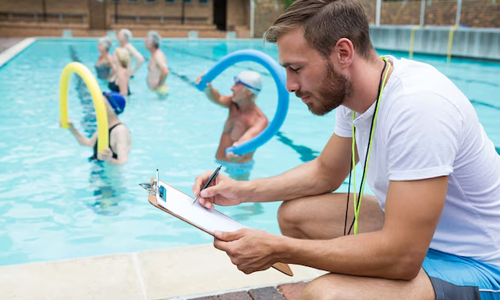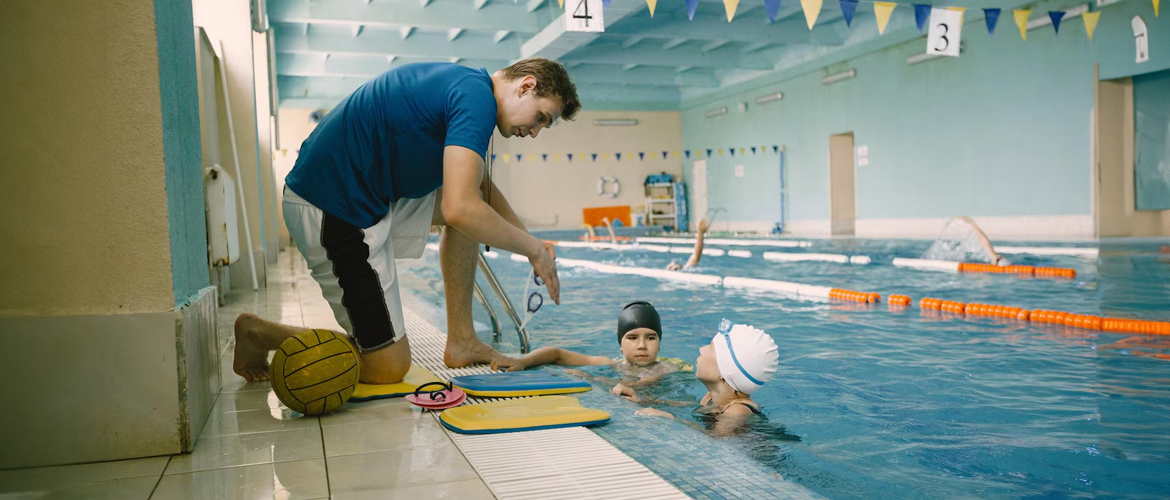Swimming pools can provide endless fun and relaxation, but ensuring safety is paramount to preventing accidents, injuries, and even death if proper precautions are not taken. So, to make the entire swimming experience more joyful and pleasing, It is better to follow certain vital safety tips, as follows: Here are comprehensive safety measures for swimming pools to consider. Swimming Pool Safety Tips – General Guidelines 1. Supervision It is essential to have considerable adult supervision, particularly if children are swimming. Even if kids know how to swim, adults must still make sure that they are protected from all sorts of unpredicted accidents. If you are in a commercial pool, then also check for the status of lifeguards, as they must be responsible enough to keep an eye on children. 2. Fencing and Barriers To add more security to the pool...
Swimming pools can provide endless fun and relaxation, but ensuring safety is paramount to preventing accidents, injuries, and even death if proper precautions are not taken. So, to make the entire swimming experience more joyful and pleasing, It is better to follow certain vital safety tips, as follows:
Here are comprehensive safety measures for swimming pools to consider.
Swimming Pool Safety Tips – General Guidelines

1. Supervision
- It is essential to have considerable adult supervision, particularly if children are swimming. Even if kids know how to swim, adults must still make sure that they are protected from all sorts of unpredicted accidents.
- If you are in a commercial pool, then also check for the status of lifeguards, as they must be responsible enough to keep an eye on children.
2. Fencing and Barriers
- To add more security to the pool area, it must be properly fenced, as it offers great protection to kids even when adults are not around. Install a fence that is at least 4 feet high with a self-closing, self-latching gate to prevent unauthorized access.
- When the pool is not in use, cover the pool with a secure pool cover to prevent accidental falls.
3. Alarms
- Install pool alarms on doors leading to the pool area, underwater alarms, and surface wave alarms to alert you of any unauthorized access.
4. Safety Equipment
- Be sure to enter a pool that comes with plenty of life rings, safety jackets, or floating devices around it. Even the weight limit on such jackets must also be properly checked. These are of great support to those who are new to swimming or are not at all aware of it.
- Always keep lifesaving equipment, such as a fully stocked first aid kit, near the pool.
5. Education and Training
- Ensure all swimmers, especially children, have taken swimming lessons.
- Learn CPR, and make sure others who supervise pool activities are also trained.
6. Water Quality
- Check and maintain proper chemical levels (chlorine, pH, and alkalinity) to ensure the water is safe and clean. Ensure the pool’s filtration system is working correctly, and clean it regularly.
7. Proper Cleaning
- Regularly remove leaves, bugs, and other debris from the pool. Also, vacuum the pool regularly to keep it clean and free of algae.
8. Electrical Safety
- Ensure all electrical equipment around the pool is properly grounded and bonded. Also, install ground fault circuit interrupters (GFCIs) for outlets near the pool to prevent electrical shock.
9. Pool Drains
- Install anti-entrapment drain covers to prevent swimmers from getting stuck by suction.
Child Safety
Pool Toys and Floats
- Ensure that pool toys and floats are used appropriately and do not give a false sense of security to non-swimmers.
- Store pool toys out of the water when not in use to prevent children from being tempted to reach for them.
Swim Diapers
- Use swim diapers for infants and toddlers to maintain water hygiene.
Emergency Preparedness
1. Emergency Contact Information
- Keep emergency contact numbers, including local emergency services and poison control, posted near the pool.
2. Emergency Procedures
- Have a clear emergency action plan and practice it regularly with family and guests.
3. Rescue Techniques
- Be familiar with basic rescue techniques, such as reaching assists and how to use a rescue hook.
Safety Rules for Swimmers
1. No Running
- Running near the pool can lead to slips and falls. Always walk around the pool area.
Also Read: Tips to master the art of running
2. No Diving in Shallow Water
- Ensure that diving is only done in designated deep areas to prevent head and neck injuries.
3. Buddy System
- Never swim alone. Use the buddy system to ensure that help is always nearby.
4. No Alcohol
- Alcohol impairs judgment and coordination. Avoid drinking alcohol while swimming or supervising swimmers.
By implementing these safety measures, you can significantly reduce the risk of accidents and ensure a safe and enjoyable swimming experience for everyone.
Stephenie
Stephenie is a passionate health blogger dedicated to promoting wellness and healthy living. With over a decade of experience in the health industry, she combines her expertise with her love for writing to share insightful tips on nutrition, fitness, and holistic health. Her blog is a trusted resource for those seeking practical advice and inspiration for a healthier lifestyle.
Related posts
Women Tips
Enter your email address to subscribe to this blog and receive notifications of new posts by email.
We use cookies on our website to give you the most relevant experience by remembering your preferences and repeat visits. By clicking “Accept All”, you consent to the use of ALL the cookies. However, you may visit "Cookie Settings" to provide a controlled consent.
Manage consent
Privacy Overview
This website uses cookies to improve your experience while you navigate through the website. Out of these, the cookies that are categorized as necessary are stored on your browser as they are essential for the working of basic functionalities of the website. We also use third-party cookies that help us analyze and understand how you use this website. These cookies will be stored in your browser only with your consent. You also have the option to opt-out of these cookies. But opting out of some of these cookies may affect your browsing experience.
Necessary cookies are absolutely essential for the website to function properly. These cookies ensure basic functionalities and security features of the website, anonymously.
| Cookie | Duration | Description |
|---|---|---|
| cookielawinfo-checkbox-analytics | 11 months | This cookie is set by GDPR Cookie Consent plugin. The cookie is used to store the user consent for the cookies in the category "Analytics". |
| cookielawinfo-checkbox-functional | 11 months | The cookie is set by GDPR cookie consent to record the user consent for the cookies in the category "Functional". |
| cookielawinfo-checkbox-necessary | 11 months | This cookie is set by GDPR Cookie Consent plugin. The cookies is used to store the user consent for the cookies in the category "Necessary". |
| cookielawinfo-checkbox-others | 11 months | This cookie is set by GDPR Cookie Consent plugin. The cookie is used to store the user consent for the cookies in the category "Other. |
| cookielawinfo-checkbox-performance | 11 months | This cookie is set by GDPR Cookie Consent plugin. The cookie is used to store the user consent for the cookies in the category "Performance". |
| viewed_cookie_policy | 11 months | The cookie is set by the GDPR Cookie Consent plugin and is used to store whether or not user has consented to the use of cookies. It does not store any personal data. |
Functional cookies help to perform certain functionalities like sharing the content of the website on social media platforms, collect feedbacks, and other third-party features.
Performance cookies are used to understand and analyze the key performance indexes of the website which helps in delivering a better user experience for the visitors.
Analytical cookies are used to understand how visitors interact with the website. These cookies help provide information on metrics the number of visitors, bounce rate, traffic source, etc.
Advertisement cookies are used to provide visitors with relevant ads and marketing campaigns. These cookies track visitors across websites and collect information to provide customized ads.
Other uncategorized cookies are those that are being analyzed and have not been classified into a category as yet.

